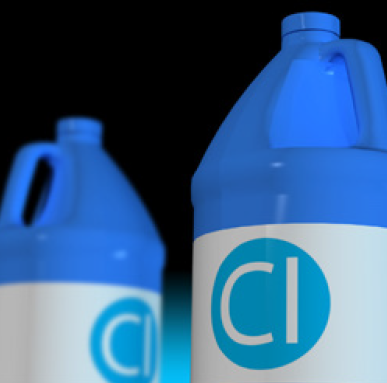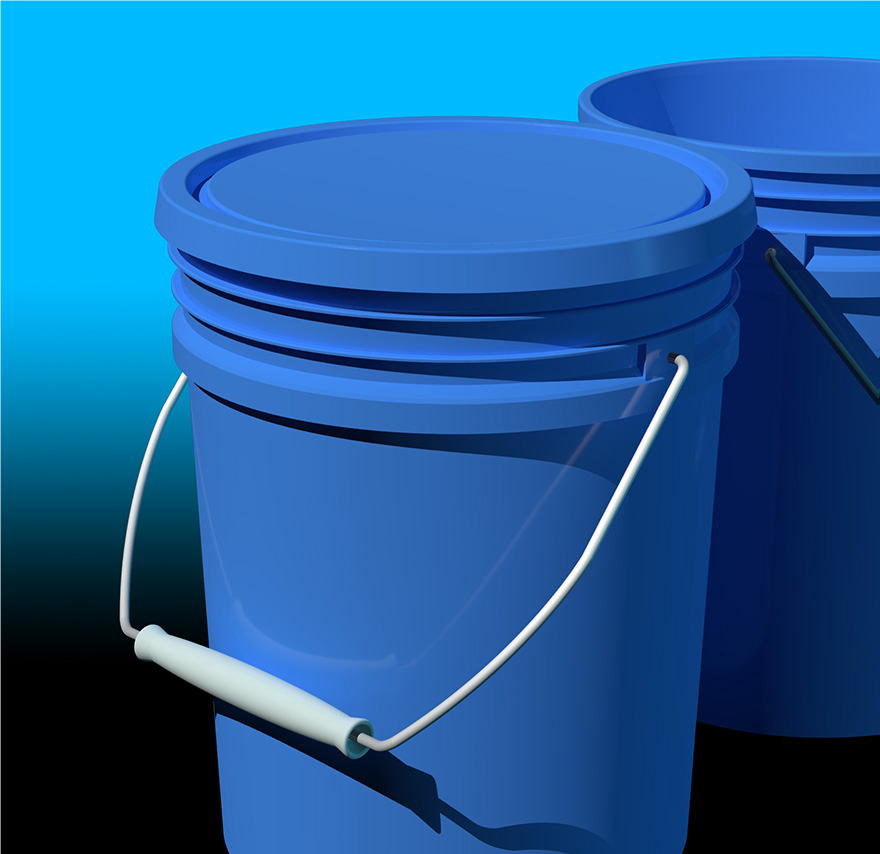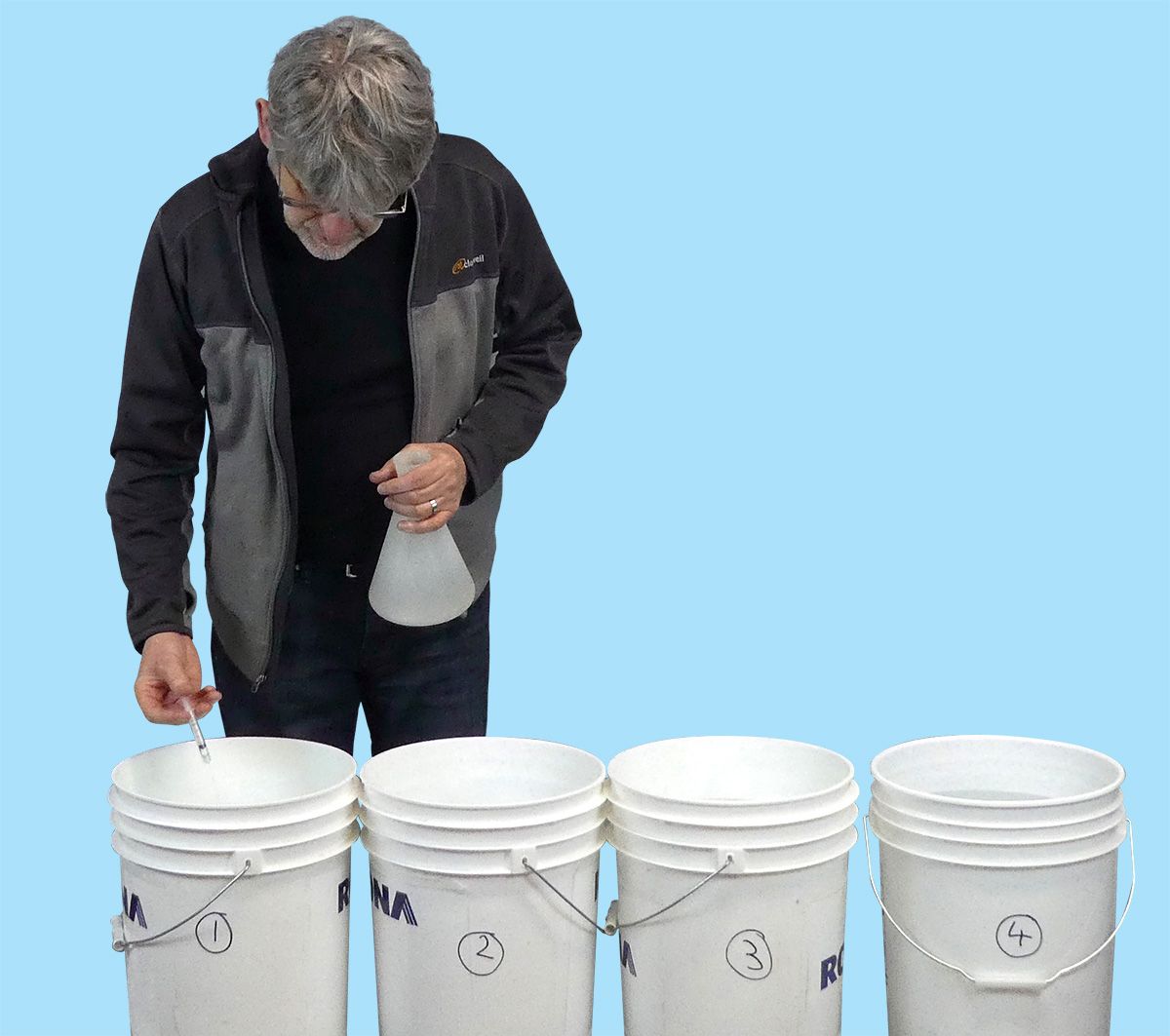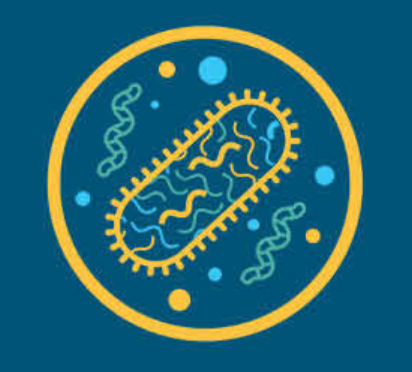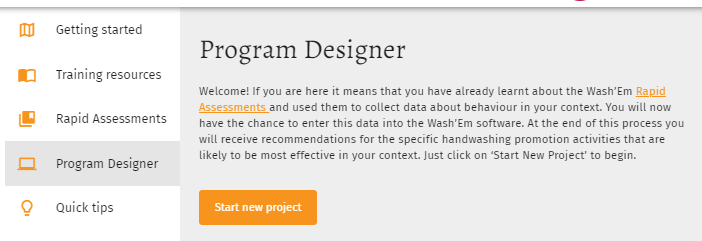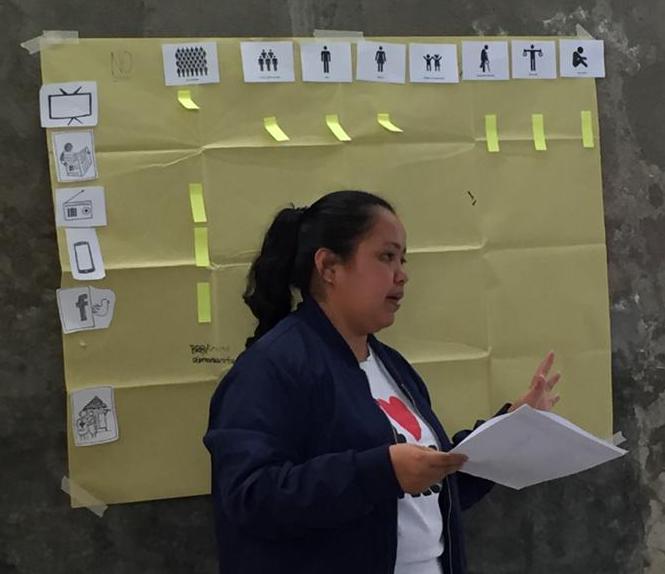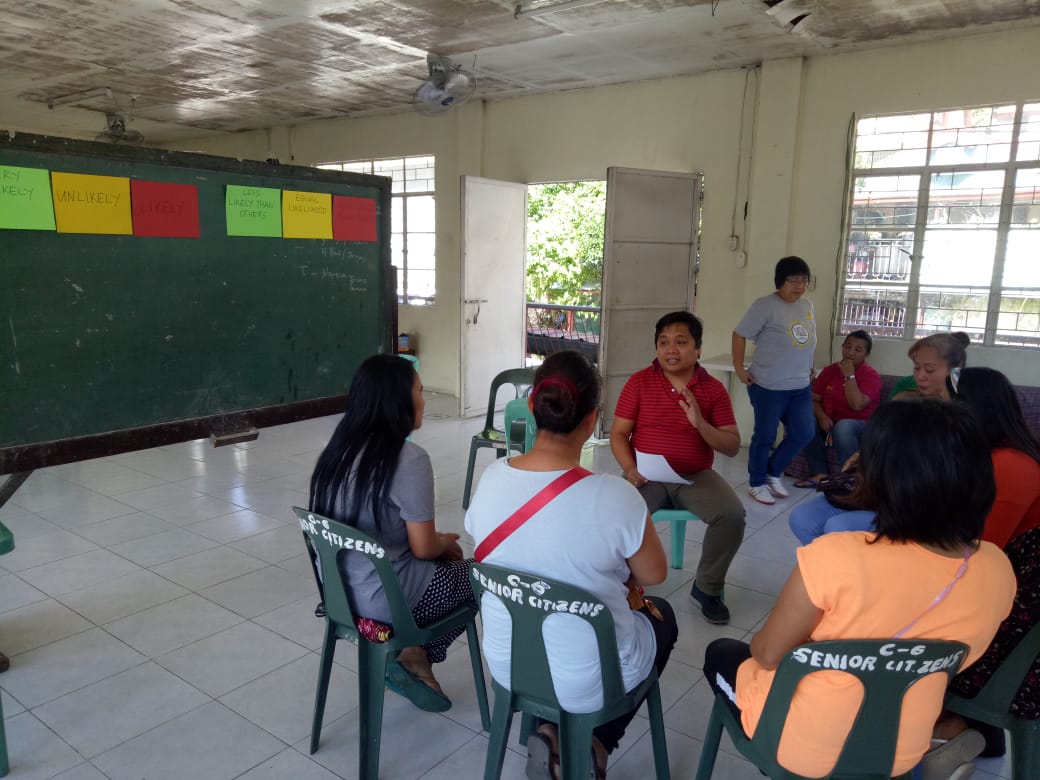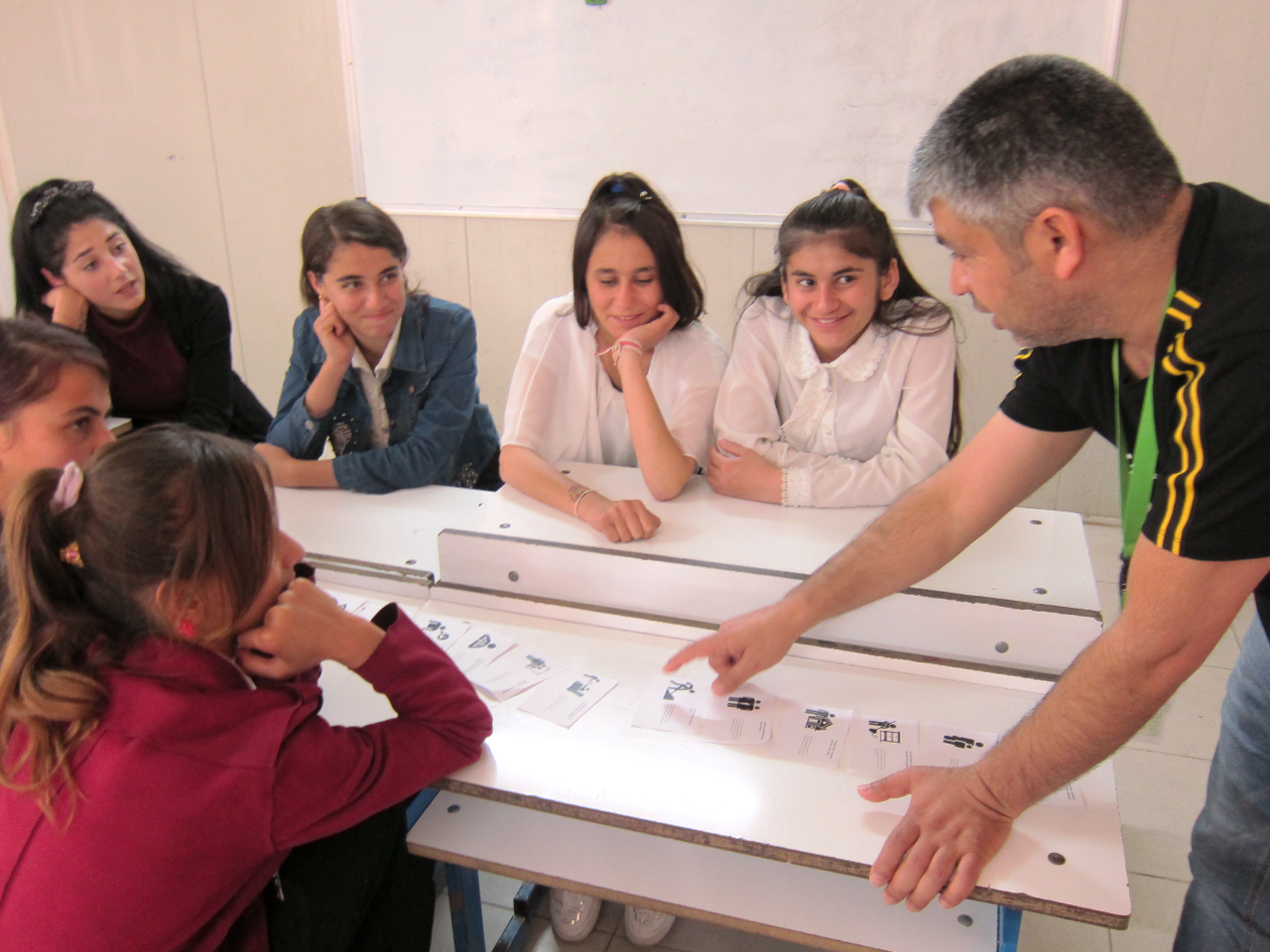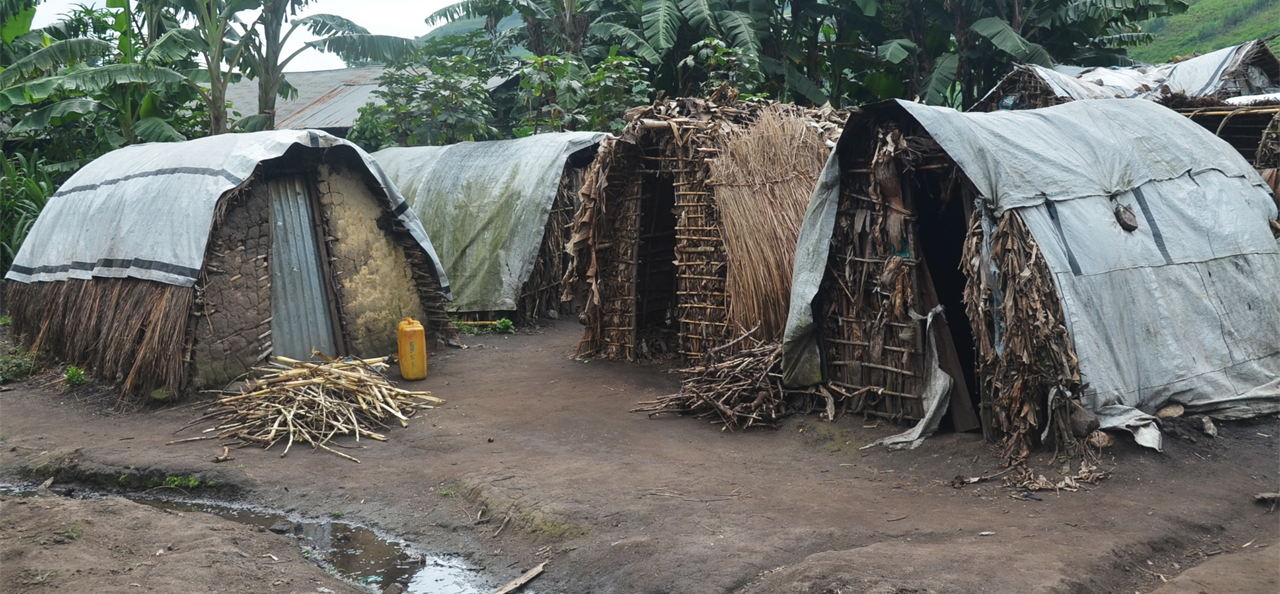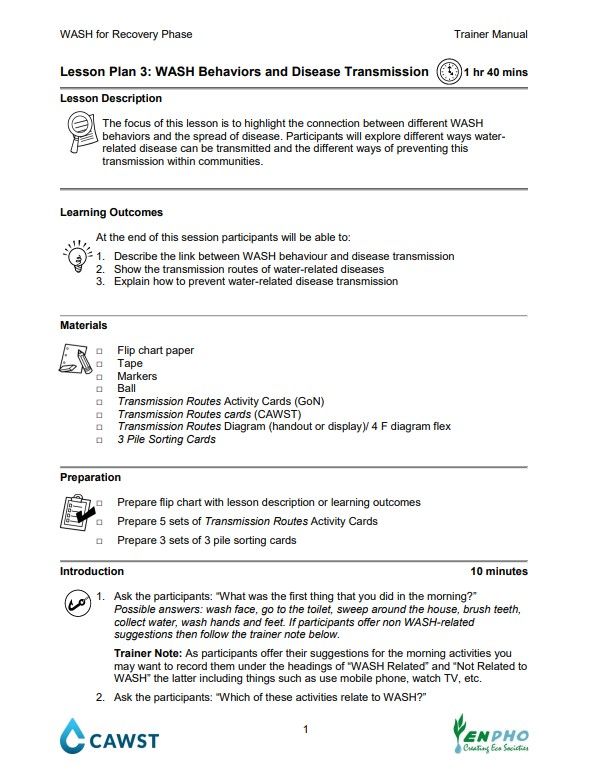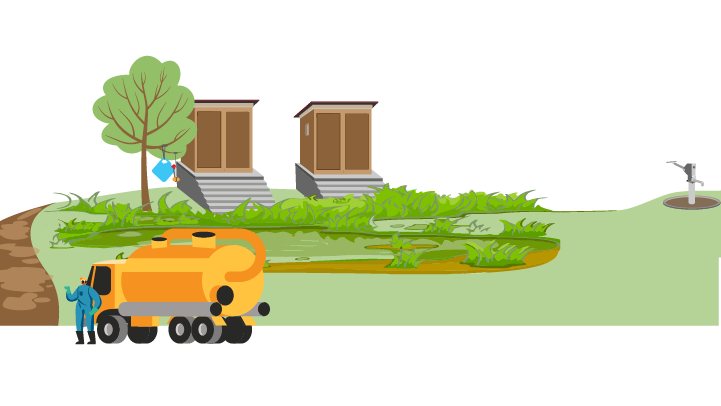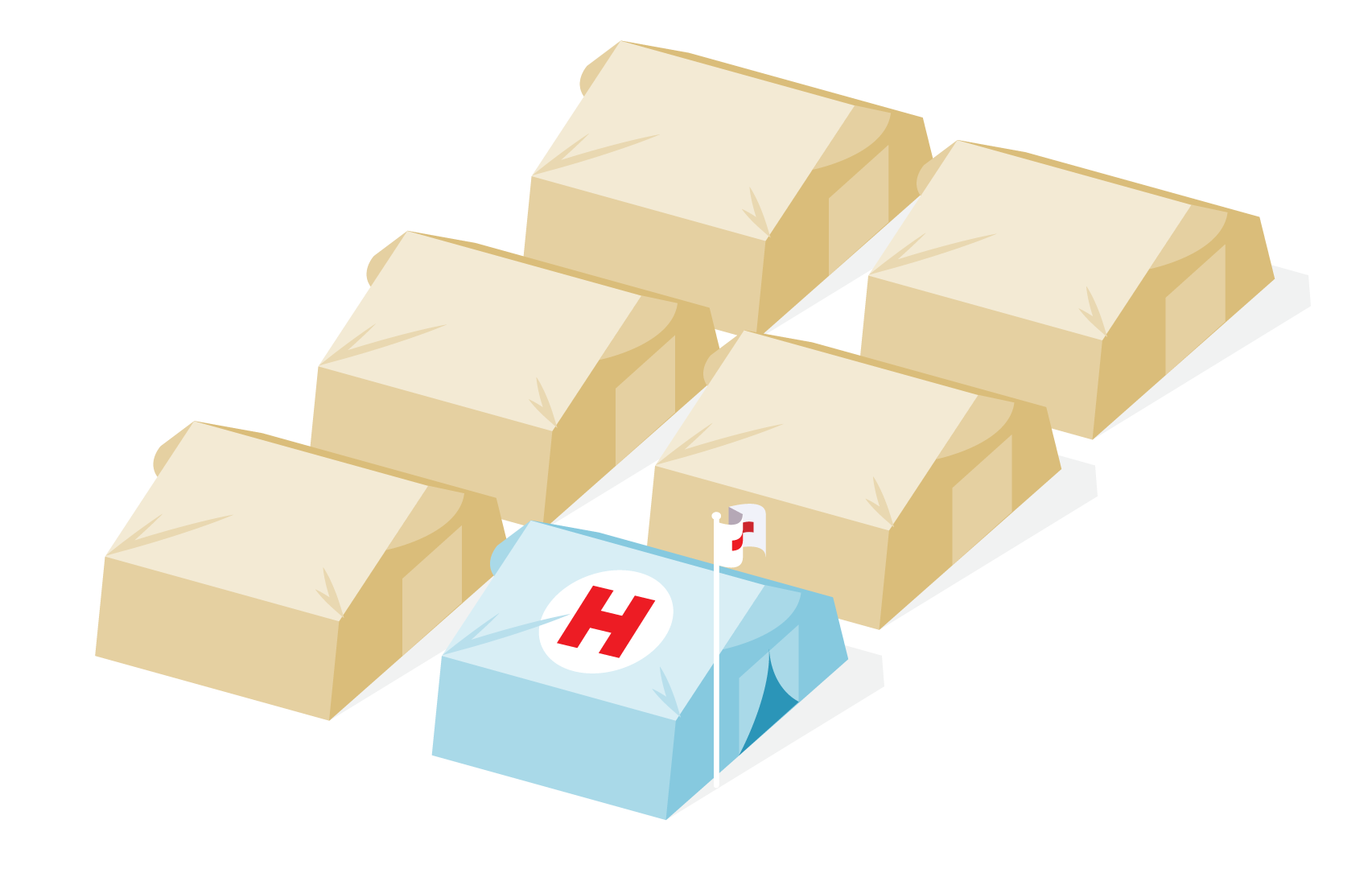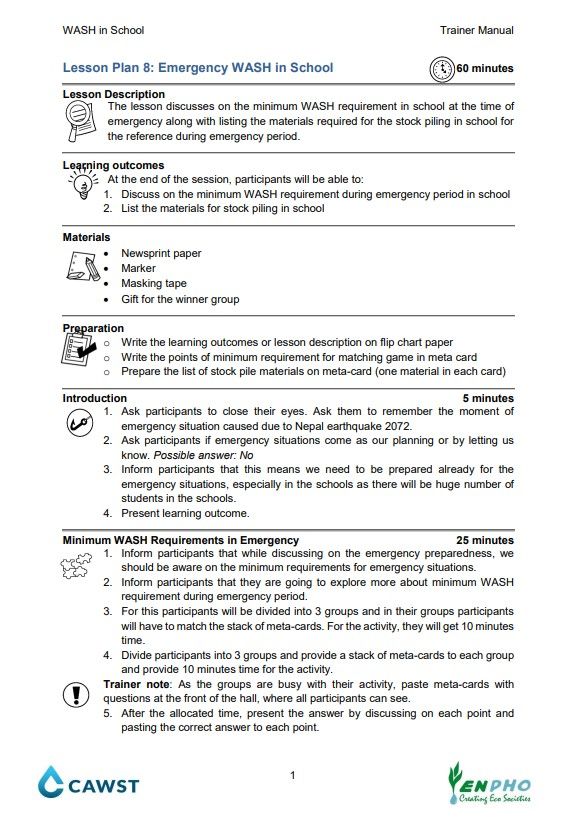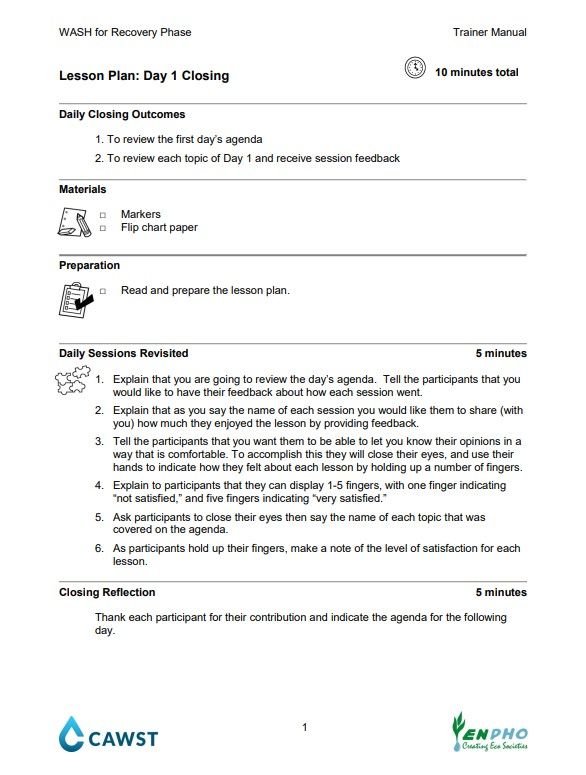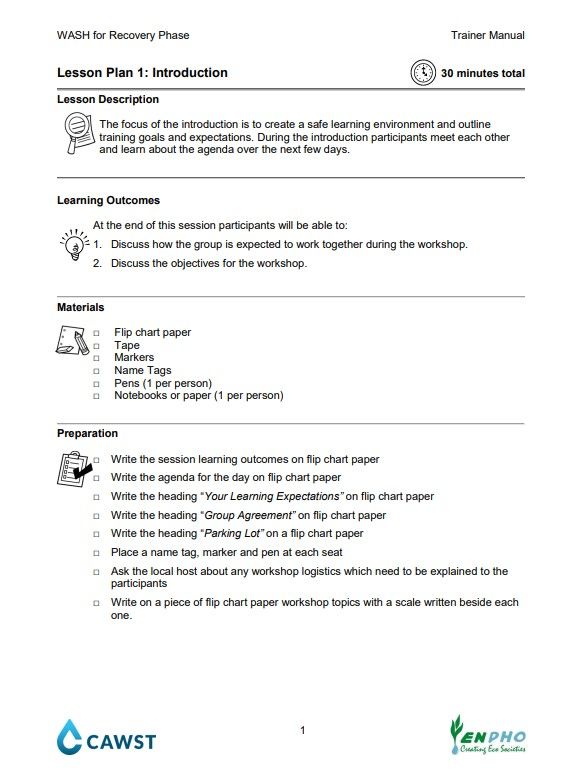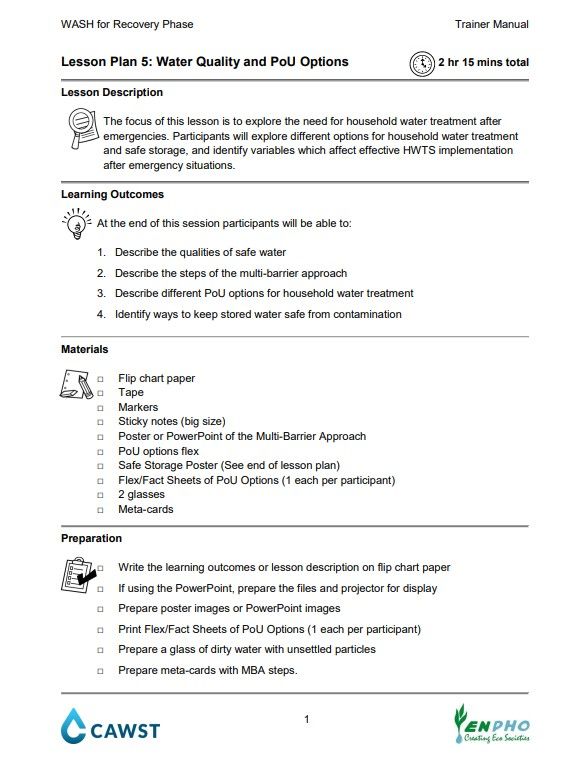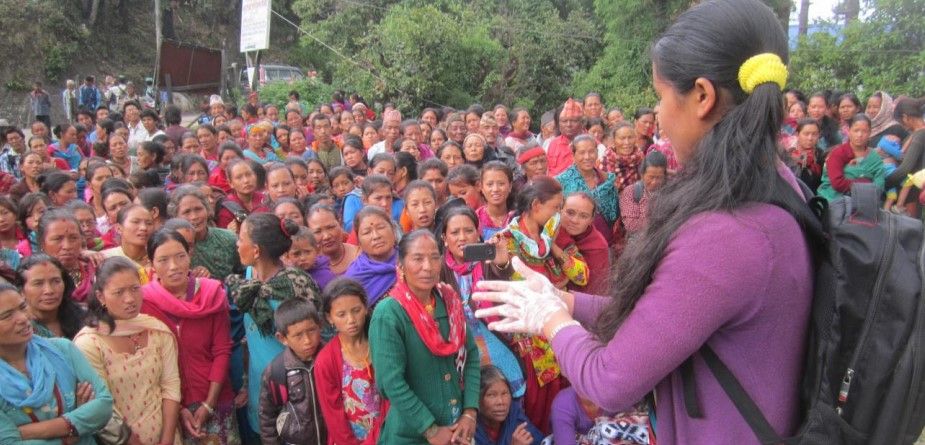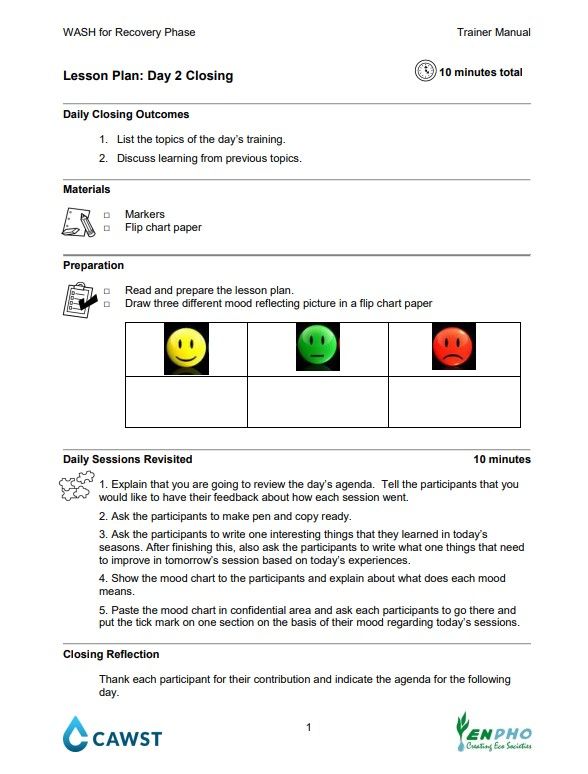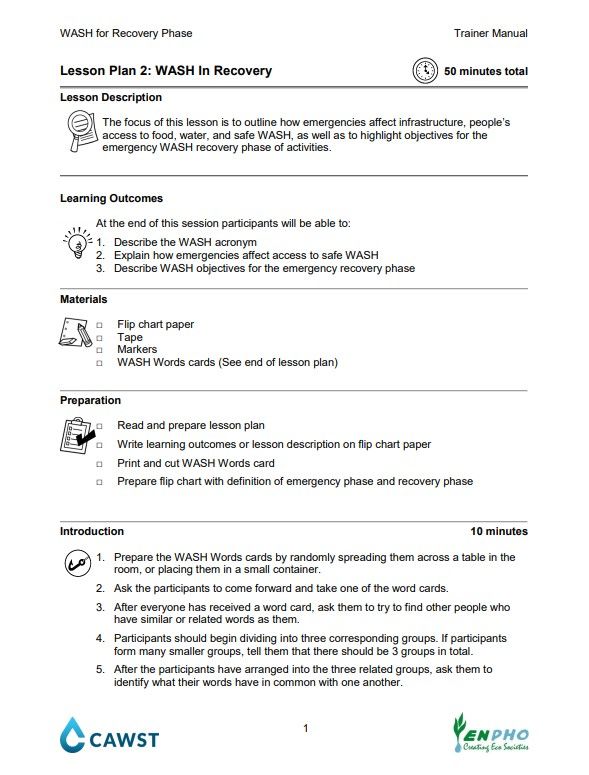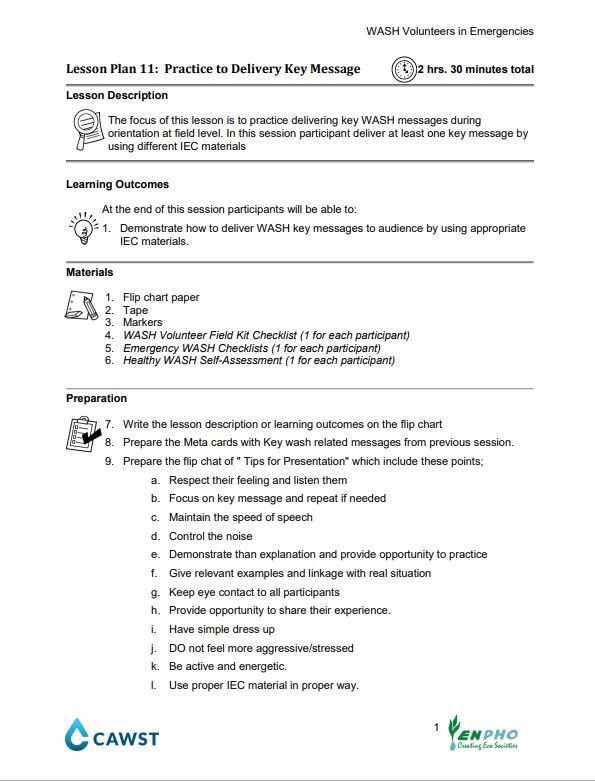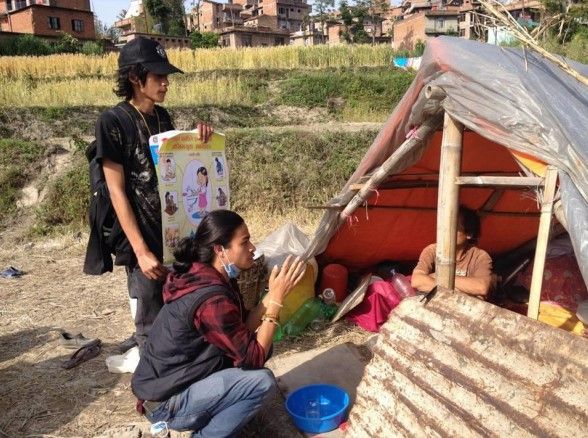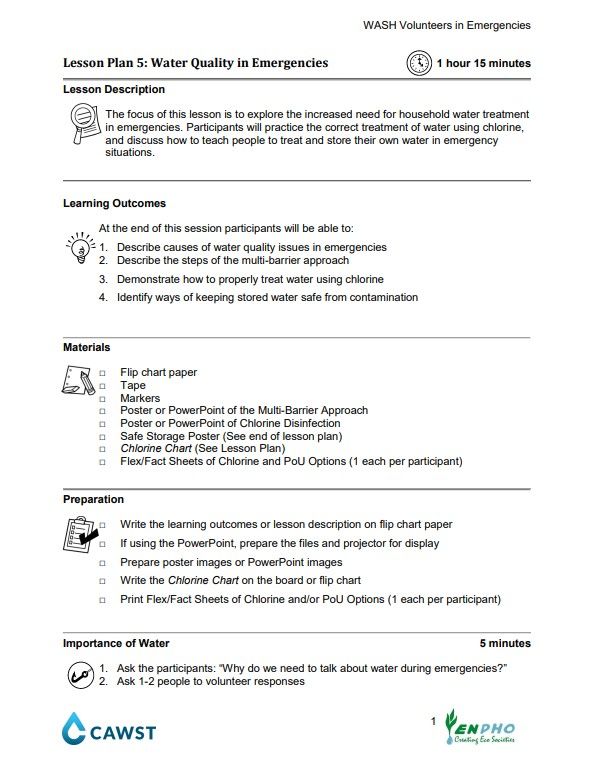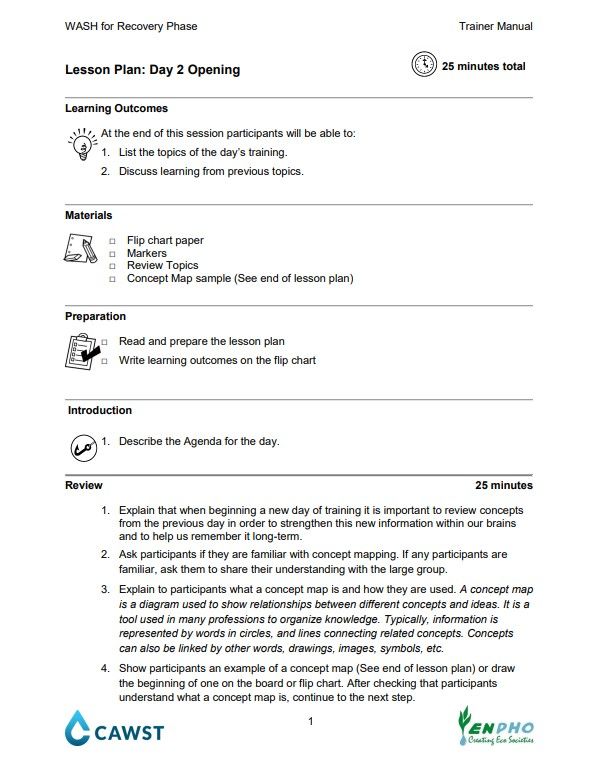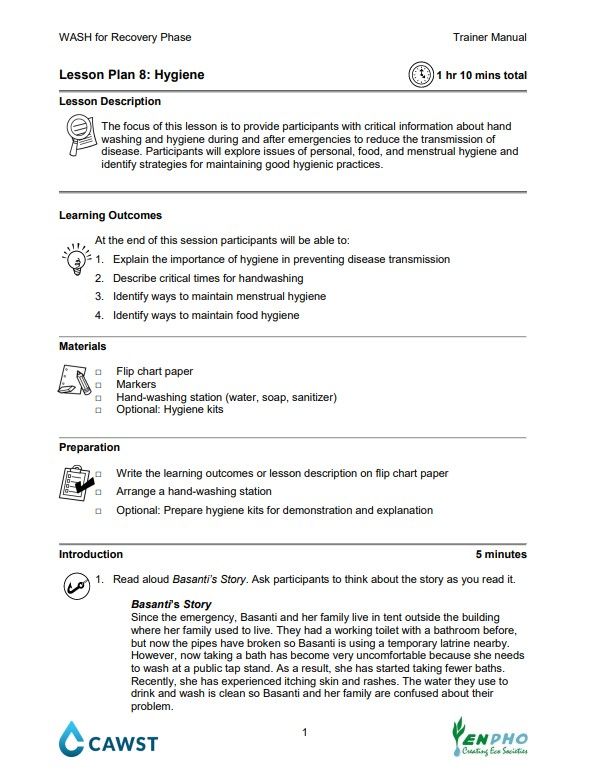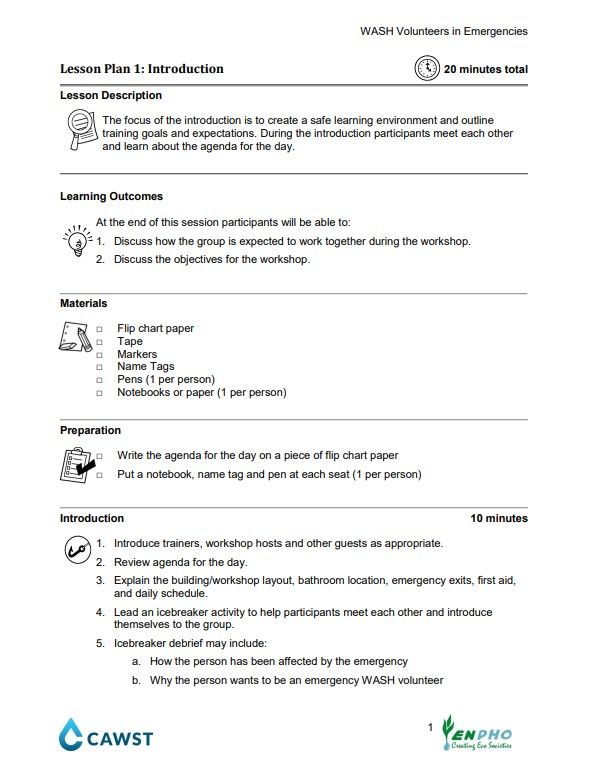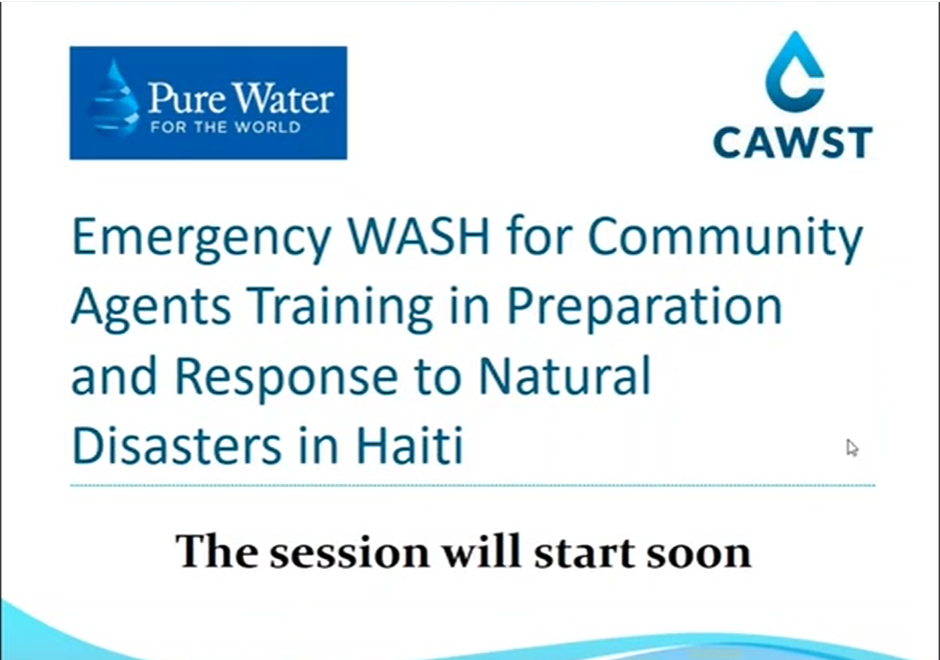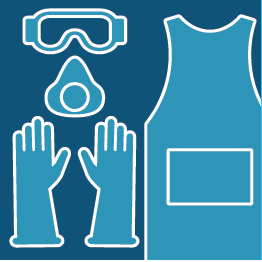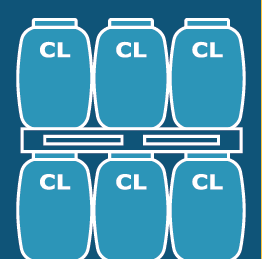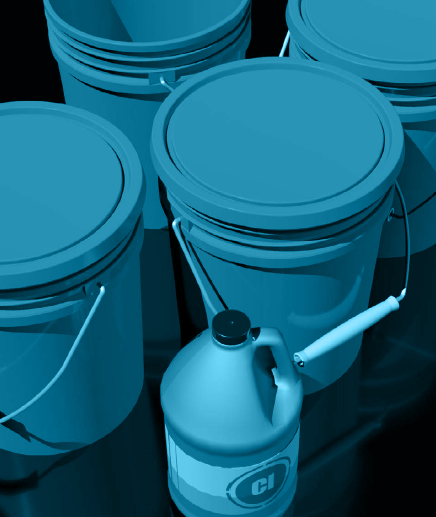Explore Emergency WASH
Chlorine Dose Calculator: Batch Chlorination of Drinking Water
Use this calculator to determine the amount of chlorine to prepare a 1% chlorine solution and the amount of the 1% solution required to disinfect a batch of drinking water.
Languages
English
French
Spanish
Arabic
Portuguese
Check Before you Disinfect: Batch Chlorination Scenario
Turbidity, pH, and temperature can all impact how fast and how well chlorine products can disinfect drinking water. Challenge yourself as you manage a water delivery at a humanitarian camp; select and evaluate the required water parameter tests and learn how these parameters can affect chlorine dosage and contact time.
Languages
English
French
Spanish
Arabic
Portuguese
Learn About Water Treatment and Water Testing for Drinking Water Quality
A collection of short e-learning tools and job aids to help humanitarian and development workers test the quality of drinking water under field conditions.
Languages
English
French
Spanish
Arabic
Portuguese
How to Make a 1% Chlorine Solution
Follow this guide to prepare a 1% chlorine solution that can be used for the Modified Horrock's Test and disinfection of the water supply.
Languages
English
Arabic
French
Spanish
Using the Modified Horrocks' Test to Calculate effective Chlorine Dosage
The Modified Horrocks' Test is a method of calculating the correct chlorine dosage for a known quantity of water. Follow along with Peter Thomson, senior director at CAWST as he conducts the Horrcks' test to calculate the correct chlorine dosage for a batch of drinking water.
Languages
English
Spanish
French
Arabic
Biofilm Infographic: Are you protecting those you serve?
Use this infographic to raise awareness about an invisible threat lurking in drinking water containers called biofilm. This poster explains what biofilm is, the threat it poses, risk factors for its formation and how you can prevent it.
Languages
English
French
Spanish
Arabic
Hindi
Learn About Household Water Treatment
Wondering how you can provide safe drinking water in homes, schools and clinics in your community? Household Water Treatment and Safe Storage (HWTS) is a simple and effective solution. Find all the basics to get started here!
Languages
English
Spanish
French
Arabic
Hindi
Wash'Em: Using the Software
In this module, you'll learn how to navigate the Wash'Em website and use the Program Designer to generate program recommendations.
Languages
English
Wash'Em: Logistics
This module highlights the details you'll need to take care of before you leave for your community visit.
Languages
English
Wash'Em: Touchpoints
This tool will help you identify channels of communication so that you can prioritize which ones are likely to be the most effective in reaching your population.
Languages
English
Wash'Em: Disease Perception
The Disease Perception tool helps you to understand people’s perceptions of the disease you are interested in.
Languages
English
Wash'Em: Motives
The Motives tool will help you to identify what is driving handwashing behaviour, or preventing it, in your context.
Languages
English
Wash'Em: The Context
For humanitarians that are not currently working in a crisis situation, this e-learning module provides three realistic contexts to practice with.
Languages
English
WASH Behaviors and Disease Transmission - Lesson Plan (WASH-R Nepal)
The focus of this lesson is to highlight the connection between different WASH behaviors and the spread of disease. Participants will explore different ways water-related disease can be transmitted and the different ways of preventing this transmission within communities.
Languages
English
Latrine Siting and Access
This module will guide you through important considerations for siting a latrine by focusing on accessibility from the pit emptier's perspective.
Languages
English
Spanish
French
Arabic
Behaviour Change Challenge
Challenge yourself to change hygiene behaviours linked to Cholera transmission in this simulated scenario.
Languages
English
Spanish
French
Arabic
WASH in Schools (WiS Nepal) Workshop
This collection is intended to support people who facilitate WASH in School. It is based on the practical experience of the Environment and Public Health Organization (ENPHO) and the Centre for Affordable Water and Sanitation Technology (CAWST). It has been developed specifically for the context of Nepal.
Languages
English
Emergency WASH for Volunteers (E-WASH Nepal) Workshop
This collection is for trainers who are interested in delivering training on Emergency WASH for volunteers in the context of Nepal. It was developed following the 2015 earthquake in Nepal. It includes lesson plans, agendas, and guidance on training delivery.
Languages
English
WASH for Recovery (WASH-R Nepal) Workshop
This workshop is intended to support people who facilitate WASH awareness workshops. It is based on the practical experience of the Environment and Public Health Organization (ENPHO) and the Centre for Affordable Water and Sanitation Technology (CAWST). It has been developed specifically for the context of Nepal. The lessons are for WASH promoters and work well for participants with low levels of literacy. Each lesson comes with the materials needed or instructions on how to build the necessary materials.
Languages
English
Emergency WASH - Lesson Plan (WiS Nepal)
The lesson discusses on the minimum WASH requirement in school at the time of emergency along with listing the materials required for the stock piling in school for the reference during emergency period.
Languages
English
Learn About Drinking Water Treatment for Emergency Contexts
A collection of short e-learning tools and job aids to help water technicians treat, disinfect and safely handle drinking water under field conditions.
Languages
English
French
Spanish
Arabic
Portuguese
Hindi
Learn About Behaviour Change
In this collection you will find online learning activities and job aids that will help you to incorporate behaviour change into WASH program design.
Languages
English
Spanish
French
Arabic
Learn About Sanitation for Emergency Contexts
A collection of short e-learning tools and job aids to guide sanitation officials regarding emptying, transport and treatment/disposal (fecal sludge management) appropriate for humanitarian contexts.
Languages
English
Spanish
French
Arabic
Emergency Hygiene - Lesson Plan (E-WASH Nepal)
The focus of this lesson is to provide participants with critical information about hand washing and hygiene during emergencies to prevent the spread of disease.
Languages
English
Day 1 Closing - Lesson Plan (WASH-R Nepal)
This lesson plan contains a review for day one of the workshop.
Languages
English
Introduction - Lesson Plan (WASH-R Nepal)
The focus of the introduction is to create a safe learning environment and outline training goals and expectations. During the introduction participants meet each other and learn about the agenda over the next few days.
Languages
English
Coordinating for Support - Lesson Plan (E-WASH Nepal)
The focus of this lesson is to provide participants with information on organizations working in the disaster affected area, support these organizations are providing, and contact information to reach their services.
Languages
English
Water Quality and PoU Options - Lesson Plan (WASH-R Nepal)
The focus of this lesson is to explore the need for household water treatment after emergencies. Participants will explore different options for household water treatment and safe storage, and identify variables which affect effective HWTS implementation after emergency situations.
Languages
English
Working with People in Emergencies - Lesson Plan (E-WASH Nepal)
The focus of this lesson is to describe the current and ongoing goals of the emergency response effort, how an emergency WASH volunteer contributes to those efforts, as well as clarifies scope for the volunteer role. Participants will explore communication techniques for interacting with disaster-affected people so they are equipped with the tools they need while working in communities or in temporary relief sites.
Languages
English
Day 2 Opening - Lesson Plan (E-WASH Nepal)
This lesson plan contains a morning review from day one of the workshop. The review activities allow participants an opportunity to practice what they learned the day before.
Languages
English
WASH for Recovery Nepal Trainer Manual
This manual is for trainers who are interested in delivering training on WASH for Recovery in the context of Nepal. It was developed following the 2015 earthquake in Nepal. It includes lesson plans, agendas, and guidance on training delivery.
Languages
English
Day 2 Closing - Lesson Plan (WASH-R Nepal)
This is a lesson plan for the WASH for Recovery Nepal workshop about how to review the concepts covered in Day 2.
Languages
English
WASH in Recovery - Lesson Plan (WASH-R Nepal)
The focus of this lesson is to outline how emergencies affect infrastructure, people’s access to food, water, and safe WASH, as well as to highlight objectives for the emergency WASH recovery phase of activities.
Languages
English
Waste Management - Lesson Plan (WASH-R Nepal)
The focus of this lesson is to outline important considerations for waste management after emergency situations. Participants will discuss the increased importance of sanitation as disaster relief transitions to recovery, and explore strategies for the successful management of sanitation issues.
Languages
English
Coordinating for Recovery Activities - Lesson Plan (WASH-R Nepal)
The focus of this lesson is to provide participants with information on organizations working in areas that were affected by the disaster, the support these organizations are providing to ongoing recovery activities, and contact information to reach their services.
Languages
English
Practice Delivering Key Messages - Lesson Plan (E-WASH Nepal)
The focus of this lesson is to practice delivering key WASH messages during orientation at field level. In this session participant deliver at least one key message by using different IEC materials.
Languages
English
WASH in Emergencies - Lesson Plan (E-WASH Nepal)
The focus of this lesson is to outline how emergencies affect infrastructure, people’s access to food, water, and safe WASH, as well as to highlight the connection between emergencies and the increased risk of communicable disease in affected areas.
Languages
English
Emergency WASH for Volunteers Nepal Trainer Manual
This manual is for trainers who are interested in delivering training on Emergency WASH for volunteers in the context of Nepal. It was developed following the 2015 earthquake in Nepal. It includes lesson plans, agendas, and guidance on training delivery.
Languages
English
Water Quality in Emergencies - Lesson Plan (E-WASH Nepal)
The focus of this lesson is to explore the increased need for household water treatment in emergencies. Participants will practice the correct treatment of water using chlorine, and discuss how to teach people to treat and store their own water in emergency situations.
Languages
English
Day 2 Opening - Lesson Plan (WASH-R Nepal)
This lesson plan contains a morning review for day one of the workshop. The review activities allow participants an opportunity to practice what they learned the day before.
Languages
English
Key WASH Messages for Emergencies - Lesson Plan (E-WASH Nepal)
The focus of this lesson is to practice delivering key WASH messages during orientation at field level. In this session participant deliver at least one key message by using different IEC materials.
Languages
English
Hygiene - Lesson Plan (WASH-R Nepal)
The focus of this lesson is to provide participants with critical information about hand washing and hygiene during and after emergencies to reduce the transmission of disease. Participants will explore issues of personal, food, and menstrual hygiene and identify strategies for maintaining good hygienic practices.
Languages
English
Introduction - Lesson Plan (E-WASH Nepal)
The focus of the introduction is to create a safe learning environment and outline training goals and expectations. During the introduction participants meet each other and learn about the agenda for the day.
Languages
English
Emergency Sanitation - Lesson Plan (E-WASH Nepal)
The focus of this lesson is to outline the important considerations for excreta management and temporary latrine siting and construction during emergency situations. Participants will discuss the increased importance of sanitation during disasters and select appropriate technologies for temporary disaster relief.
Languages
English
Development and Delivery: Emergency WASH for Community Agents Training in Preparation and Response to Natural Disasters in Haiti
The presentation that will be delivered will speak about the WASH context in Haiti and how natural disasters have shaped Haiti’s access to safe water and sanitation. WASH Training and Consulting Services at Pure Water for the World in 2015 were able to co-develop an EWASH (Emergency WASH) training for CHPs during times of emergency. The presenter will speak about why emergency situations are different than other contexts and how this context presents difficulties in terms of delivering effective WASH solutions. The presentation will cover three recent natural disasters that struck Haiti (Earthquake 2010, Hurricane Mathew, Hurricane Irma) and how Pure Water for the World responded. The presentation will emphasize the impact that education can have after or before a disaster and how this differs from a direct on the ground response. The presentation will also cover why we chose to develop this training and what our goals were for the new workshop and how it is evolving. This presentation will mainly focus on our recent response to Hurricane Irma where we were able to deliver the workshop two times the week following the hurricane once in Port au Prince and then after in Cap Haitien where flooding and heavy rains were most prevalent. Facilitator: Andrew Scott Coco has been traveling to Haiti since 2011, where his mother was a medical volunteer after the 2010 earthquake. She eventually began working for Pure Water for the World shortly thereafter, while Andrew was studying Environmental Studies at the University of Vermont with a degree focus on Sustainability studies. Andrew has subsequently volunteered with Pure Water for the World during his school breaks and summer vacation since 2012. Over time, Scott found that all his course work and school focus were about Haiti: all the classes, papers, and degree track tied back into his ongoing experience in Haiti. He secured an internship with Pure Water for the World working in the Water Quality Testing laboratory in 2013.
Languages
English
Diarrheal Disease Response - Lesson Plan (WASH-R Nepal)
The focus of this lesson is to explore different diarrheal diseases present within communities and to identify ways of responding to them. Participants will discuss effective measures for responding to the presence of diarrheal disease and demonstrate how to effectively prepare oral rehydration solution in an emergency response context.
Languages
English
Disease Transmission and Blocking - Lesson Plan (E-WASH Nepal)
The focus of this lesson is for participants to discuss the connection between the environment and the spread of disease during emergencies. Participants will explore transmission routes of water-related diseases as well as ways to prevent these diseases from spreading in disaster affected areas.
Languages
English
Workshop Closing - Lesson Plan (E-WASH Nepal)
The focus of this lesson is to evaluate the information covered in the workshop and provide feedback on the training. Participants will also receive information on how to access additional support or training as an emergency WASH volunteer.
Languages
English
Encouraging Latrine Use - Lesson Plan (WASH-R Nepal)
The focus of this lesson is to outline important considerations for latrine use during and after emergency situations. Participants will discuss the increased importance of sanitation as disaster relief transitions to recovery, and explore strategies for the successful management of sanitation issues.
Languages
English
Handle Chlorine Products Safely!
Follow the guidelines in this poster to handle and use chlorine products safely. This poster is ideal for printing and placing in any location where chlorine products are handled and stored.
Languages
English
French
Spanish
Arabic
Store Chlorine Products Safely!
Follow the guidelines in this poster to store and transport chlorine products safely. This poster is ideal for printing and placing in any location where chlorine products are handled and stored.
Languages
English
Spanish
French
Arabic
Calculate your Chlorine Dose: Modified Horrocks' Test Instructions
This guide provides instructions for conducting the Modified Horrocks Test. This test is used to determine the effective chlorine dose for batch chlorination of drinking water.
Languages
English
Spanish
French
Arabic
Check Before you Disinfect: Turbidity, pH, and Temperature in Drinking Water Chlorination
Turbidity, pH, and temperature can all impact how fast and how well chlorine products can disinfect drinking water. Use this guide to determine how these parameters will affect your chlorine dosage and contact time.
Languages
English
Arabic
French
Spanish
Learn about Wash'Em
The Wash’Em process involves using 5 rapid assessment tools to understand handwashing behaviours during a crisis. You then enter the findings into the Wash’Em software for tailored program recommendations.
Languages
English
About CAWST
CAWST is a Canadian charity and licensed engineering firm. We address the global need for safe drinking water and sanitation by building local knowledge and skills on household solutions people can implement themselves.
